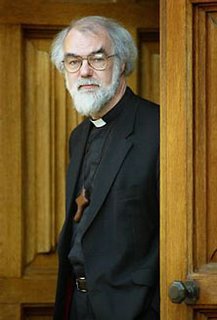At
St. Alban's Chapel at LSU there is on Wednesdays an event called “Lunch with C.S. Lewis” that I try to attend when able. Recently there was a conversation that got me to thinking some more about the use of theological concepts in political discourse, particularly the rhetoric being used to rally support for “the war on terror” which we Americans are now fighting.
I began thinking that there may be a sort of dualism in the language that is used by the President and others painting the “terrorists” as pure evil, as haters of freedom and democracy. Our Freedom and Democracy, as we were all taught in school (and probably church) are intrinsically good (you should detect sarcasm here, because I certainly do not think this is the case), and of course those who hate absolutely that which is intrinsically good must therefore be intrinsically bad. So memorable phrases like “the axis of evil” come to mind used to paint those who have attacked us as essentially “the devil” and, if they are, we therefore leave ourselves no choice (if we are good) but to exterminate them utterly. Note that in America we haven't made the jump (as Tony Blair has rightly done) from talking about "fighting Terrorists" to "fighting the ideology that breeds terrorists" (which is essentially a religion, I should point out).
I wonder if anyone has stopped to ask (and I do not believe the President has done so) “What have freedom and democracy ever done to them?” Because the answer might actually be “something very bad.” I think those who are being labeled “Islamo-fascists” may have some very legitimate concerns that we in the West are not even aware of. If we were, we might be able to diffuse terrorism. We simply do not understand that our democracy and our freedom (our free-market economy) is intruding upon and destroying their culture, and they don’t like it. Their children are watching “Desperate Housewives” and learning American made ideas and so those “Islamo-fascists” are watching their own culture and their own family values be consumed by the aggressive marketing strategies of the world’s biggest and most powerful (read “Western”) corporations who are trying to enlarge their markets into the newly discovered "global economy." In other words, as has been pointed out by a number of scholars, a free market economy like ours when it is combined with the globalization of economics creates a sort of cultural and economic imperialism. Unlike the imperialism of the European powers from the 18th to early 20th centuries, this imperialism is not spread by the military (usually), but by the engines of mass communication (internet, cable/satellite TV) and economic expansion. And this new imperialism is killing traditional Muslim culture (we may debate whether or not that is actually a bad thing, but I think we can all understand how traditional Muslims must see it).
The use of the sort of language that says “these people are the devil and must be destroyed” ends up sweeping reality under the rug. Reality is more complicated than that. Unfortunately, we Americans (and everyone else I think) like to keep things simple. Those who want to take and keep political power in our system are those who can capture our imaginations with a sound-bite or a bumper sticker slogan. Reality gets lost in the shuffle for (duly-elected) power.
The truth is (this is the important part) that the use of this absolutist, over-simplified language by both sides (language such as “America is the great Satan”) can only bring us to one possible place if we follow it out logically. We think they are the devil; they think we are the devil. The world is a better place if the devil is dead. Therefore both sides continue to fight until either 1) one side kills the devil (which considering the numbers of people involved and the resilience of ideology in general is highly unlikely as long as there are any people left on the planet) or 2) both sides recognize that reality is more complicated and grow up enough to address the real issues in responsible and rational ways. Sadly, based on the irrational and immature world-wide response to the pope’s comments that no one seems even to have read (I hope to comment on this in the near future), this doesn’t look too likely to happen in the near future either.
Maybe if we take a step back, stop "winning the war on terror" with military force and look at the whole situation as it has developed over the last 3 centuries or so, we might see where the real Devil has been at work and how to address it with Christian charity. But, then, it is an election year...
Labels: Cultural issues, Political Philosophy
 Rowan Williams, the 104th Archbishop of Canterbury, though theologically orthodox was expected to be a more socially liberal successor to Archbishop George Carey, an evangelical. Williams famously wrote a paper years ago in support of non-celibate homosexual clergy, much to the chagrin of moderates and conservatives. However, honored Archbishop seems to have changed his tune, recently saying that homosexuals must "change their behaviour" to fully participate in the church's life, much to the chagrin of liberals and "revisionists."
Rowan Williams, the 104th Archbishop of Canterbury, though theologically orthodox was expected to be a more socially liberal successor to Archbishop George Carey, an evangelical. Williams famously wrote a paper years ago in support of non-celibate homosexual clergy, much to the chagrin of moderates and conservatives. However, honored Archbishop seems to have changed his tune, recently saying that homosexuals must "change their behaviour" to fully participate in the church's life, much to the chagrin of liberals and "revisionists."








